-
-
- Council Members
- Role of Council Members
- Council meetings
- Council elections
- Previous election results
- Dr Louise Allum
- Dr Sam Bescoby
- Dr Andrew Clemence
- Dr Tshidi Gardiner
- Dr Reginald Godwin
- Paddy Gordon
- Dr Danielle Greenberg
- Dr Gerard Henry
- Dr Richard Hillman
- Dr Benjamin Kennedy
- Dr Tom Lonsdale
- Dr Darren Partridge
- Martin Peaty
- Alison Price
- Dr Peter Robinson
- Dr Jennifer Simmons
- Dr Sadie Spencer
- Dr Mary Thomas
- William Wilkinson
- Dr Lara Wilson
- Past-Presidents
-
- Advancement of the Professions Committee
- Standards Committee
- Audit and Risk Committee
- Education Committee
- Disciplinary Committee
- Charter Case Committee
- Preliminary Investigation Committee and Disciplinary Committee Liaison Committee
- Registration Committee
- Preliminary Investigation Committee
- Paper classification: some definitions
-
-
-
-
-
- About extra-mural studies (EMS)
- EMS requirements
- Information for vet students
- Information for EMS providers
- Information for vet schools
- Temporary EMS requirements
- Practice by students - regulations
- Health and safety on EMS placements
- EMS contacts and further guidance
- Extra-mural studies fit for the future
-
-
- Code of Professional Conduct for Veterinary Surgeons
- Code of Professional Conduct for Veterinary Nurses
- Contact the Advice Team
- XL Bully dog ban
- 'Under care' - guidance
- Advice on Schedule 3
- Controlled Drugs Guidance – A to Z
- Dealing with Difficult Situations webinar recordings
- FAQs – Common medicines pitfalls
- FAQs – Routine veterinary practice and clinical veterinary research
- FAQs – Advertising of practice names
- GDPR – RCVS information and Q&As
-
- Accrediting veterinary degrees
- Accrediting veterinary nursing qualifications
- Reasonable adjustments for student vets
- Reasonable adjustments for student veterinary nurses
- Health and disability in veterinary nurse education and training
- Reasonable adjustments for students and the UK disability discrimination legislation
- Educational assessment of veterinary nurses
- Roles of key stakeholders in the application of reasonable adjustments
- Examples of reasonable adjustments for vet nurse students
- External review of the RCVS by ENQA
- Requirements for remote and online student assessments
New President redoubles commitment to diversity in the professions and embracing change
18 July 2018
Looking at diversity in all its aspects and harnessing the positive potential of change were two of the key changes made by Amanda Boag in her inaugural speech as the new President of the Royal College of Veterinary Surgeons for 2018-19.
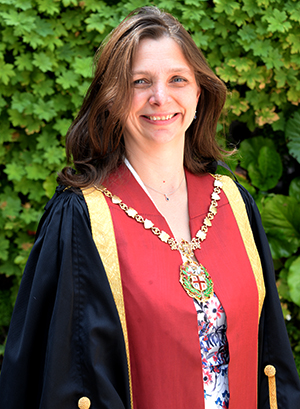 Amanda (pictured) was invested as President at Royal College Day – our Annual General Meeting and Awards Ceremony – at the Royal Institute of British Architects (RIBA) on Friday 13 July 2018, taking the reins from Professor Stephen May, who became Senior Vice-President.
Amanda (pictured) was invested as President at Royal College Day – our Annual General Meeting and Awards Ceremony – at the Royal Institute of British Architects (RIBA) on Friday 13 July 2018, taking the reins from Professor Stephen May, who became Senior Vice-President.
In her opening speech she said: “Along with specific projects, I wanted to highlight a couple of themes which will be prominent in the coming and future years.
“Firstly, the importance of diversity…. Diversity takes many forms and we must not lose sight of these. This includes ensuring our professions reflect the society we serve and are seen as a great and realistic opportunity for people from all backgrounds and, once in the professions, making sure we have an open and supportive environment where everyone is given the chance and the support to succeed.
“Secondly is the inevitability of change and the importance of harnessing it positively for our professions, but more importantly for the public and the animals we care for. This year will of course see the enormous change of Brexit and collaborating with the British Veterinary Association (BVA) and others and we will continue to speak forcefully about the importance of our professions and animal welfare.
"There are also a number of ongoing discussions focused more specifically in our industry on issues such as evolution of the veterinary nursing profession, how accountability will work in the vet-led team and the changes that telemedicine is already bringing.”
Amanda has been an elected member of RCVS Council since 2012 and in 2016 was re-elected to serve another four-year term. Since being elected she has served as RCVS Treasurer (2014-17) and on the Education Committee, PIC/DC Liaison Committee and the Operational Board. She has also played a critical role in the development of the recently launched RCVS Leadership Initiative.
Amanda graduated from Cambridge in 1998 and, after undertaking two internships, became a Lecturer in Emergency and Critical Care at the Royal Veterinary College from 2003 to 2008, where she was involved in running the referral and first-opinion emergency service. In 2008 she took up the post of Clinical Director at Vets Now, where she has a wide ranging role overseeing clinical and professional standards across the business. Amanda was Founding President of the European College of Veterinary Emergency and Critical Care (ECVECC) from 2014-2018 and served as President of the European Society of Veterinary Emergency and Critical Care (EVECCS) from 2011-2014.
AGM and changes to RCVS and VN Councils
Royal College Day 2018 started with the Annual General Meeting of the membership of the College in which new members of RCVS and VN Councils were welcomed, retiring members were thanked and appointments to the Officer team confirmed.
After an introduction to the proceedings by then President Stephen May, members approved the minutes of last year’s AGM and the Annual Report and Statement of Accounts for 2017.
RCVS Registrar Eleanor Ferguson then updated those in attendance regarding the impact of the recent Legislative Reform Order (LRO) on the College’s governance (which was passed by Parliament in May) and on RCVS Council, including a reduction in elected and university-appointed members, the ending of appointments by Privy Council and formal lay and veterinary nursing representation on Council.
Regarding the RCVS Council elections, Eleanor Ferguson said that the impact of the LRO meant that only the three candidates with the most votes (rather than the top six as previously) would take up their posts on Council. She then welcomed Susan Paterson, Mandisa Greene and Neil Smith, all of whom were re-elected, back on to Council for four-year terms.
The Registrar then welcomed the new lay members to RCVS Council, all of whom were appointed following an extensive independent recruitment process. These are: Dr Derek Bray, Mark Castle, Linda Ford, Claire McLaughlan, Tim Walker and Judy Worthington. Also welcomed were two veterinary nursing members appointed from the Veterinary Nurses Council, namely Racheal Marshall and Liz Cox, the new Chair and immediate past Chair of VN Council respectively.
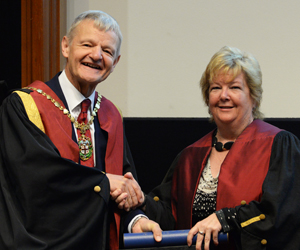 The President (Stephen May) then thanked retiring Council members Douglas Hutchison, Dr Kieron Salmon, Dr David Bartram, Elaine Acaster, David Catlow, Rachel Jennings, Dr Jacqui Molyneux (pictured) and Professor Mike Herrtage, as well as Professor Richard Hammond, Tim King and Karen Braithwaite, who were unable to attend. Stephen gave particular thanks to Jacqui Molyneux and Mike Herrtage, who had served on Council for 12 years and 21 years respectively.
The President (Stephen May) then thanked retiring Council members Douglas Hutchison, Dr Kieron Salmon, Dr David Bartram, Elaine Acaster, David Catlow, Rachel Jennings, Dr Jacqui Molyneux (pictured) and Professor Mike Herrtage, as well as Professor Richard Hammond, Tim King and Karen Braithwaite, who were unable to attend. Stephen gave particular thanks to Jacqui Molyneux and Mike Herrtage, who had served on Council for 12 years and 21 years respectively.
Dr Molyneux was President of the College in 2012-13 and was a particular champion of the Practice Standards Scheme, serving as Chair of its coordinating body, the Practice Standards Group, for five years.
 Professor Herrtage (pictured) was a member of RCVS Council appointed by the University of Cambridge and brought his expertise in education and research to bear as a member of the Education Committee, amongst many other committee roles.
Professor Herrtage (pictured) was a member of RCVS Council appointed by the University of Cambridge and brought his expertise in education and research to bear as a member of the Education Committee, amongst many other committee roles.
For VN Council there were similar changes to its governance, including a reduction in elected members (which meant there was no election this year) and new appointed lay and veterinary nurse members. First, the Registrar welcomed the new appointees, who were once again brought on board following an extensive recruitment process, these being: Belinda Andrews-Jones, Wendy Drinkwater and Katherine (Kathy) Kissick. VN Council also said thank you and farewell to the following VN Council members: Amber Richards, Dr Niall Connell, Vicky Aspinall and Hilary Orpet.
For the Officer Team, Amanda Boag was confirmed as President for 2018-19, Dr Niall Connell as Junior Vice-President, Professor Stephen May as Senior Vice-President and Christopher (Kit) Sturgess as Treasurer.
Awards and honours
Following the AGM was the awards ceremony, which, in addition to established awards such as the Queen’s Medal and International Award, saw the introduction of the inaugural Impact and Inspiration Awards.
 The occasion began with the presentation of two bequests made to the College – the first was the presentation of the scroll and parchment of Lord Soulsby of Swaffham Prior, a former President of the RCVS and the first veterinary surgeon to be elevated to a Peerage, who sadly died in May 2017. These items were presented by Judy MacArthur-Clark (pictured), a former RCVS President who is now Chair of the Trustees of the Soulsby Foundation, a charity set up in his name to promote the concept of One Health.
The occasion began with the presentation of two bequests made to the College – the first was the presentation of the scroll and parchment of Lord Soulsby of Swaffham Prior, a former President of the RCVS and the first veterinary surgeon to be elevated to a Peerage, who sadly died in May 2017. These items were presented by Judy MacArthur-Clark (pictured), a former RCVS President who is now Chair of the Trustees of the Soulsby Foundation, a charity set up in his name to promote the concept of One Health.
The second bequest was the prize awarded to veterinary surgeon Mary-Elizabeth Raw when she won the 1989 series of Mastermind. The bowl was presented by her cousin Sir Robert Nelson who praised Mary-Elizabeth’s courage and tenacity as a veterinary surgeon with multiple sclerosis who also devoted her time to helping others with disabilities.
This year the Queen’s Medal – the highest honour the College can bestow upon a veterinary surgeon in recognition of a distinguished career – was presented to Professor Peter Clegg MRCVS, Professor of Musculoskeletal Biology and Head of Research at the Institute of Ageing and Chronic Disease, in recognition of his research in the veterinary, medical and biomedical worlds and his dedication to mentoring and nurturing the careers of his students.
 Reading the citation for Professor Clegg (pictured), Stephen said: “Though Peter’s academic achievements are truly remarkable, they are heightened by his ability to nurture the careers of those around him to contribute to both the human and the veterinary medical world.”
Reading the citation for Professor Clegg (pictured), Stephen said: “Though Peter’s academic achievements are truly remarkable, they are heightened by his ability to nurture the careers of those around him to contribute to both the human and the veterinary medical world.”
Next Stephen presented two RCVS International Awards, which this year were bestowed upon Dr Alemayehu Hailemariam and Rachel Wright. Dr Hailemariam is a veterinarian who leads the Brooke equine charity’s animal health programme in Ethiopia.
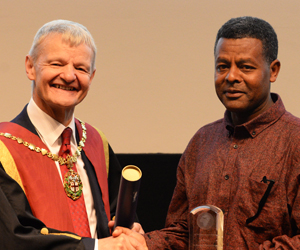 Reading his citation Stephen said: “Dr Hailemariam [pictured]… has helped an estimated 600,000 animals across Ethiopia. This is one of the world’s largest populations of working equids, belonging to some of the world’s poorest communities, who often rely upon their animals for their livelihoods. Dr Hailemariam’s work is therefore one of the finest examples of how a vet can service their whole community.”
Reading his citation Stephen said: “Dr Hailemariam [pictured]… has helped an estimated 600,000 animals across Ethiopia. This is one of the world’s largest populations of working equids, belonging to some of the world’s poorest communities, who often rely upon their animals for their livelihoods. Dr Hailemariam’s work is therefore one of the finest examples of how a vet can service their whole community.”
Rachel Wright qualified as a veterinary nurse in the UK and went on to found the Tree of Life for Animals (TOLFA) hospital in Rajasthan, India, in 2005.
Stephen said: “At the outset, there were only four staff, and no electricity or running water, but Rachel was determined to provide veterinary care for those stray animals that had nowhere else to go. Fast-forward 13 years and there is now a hospital facility covering two acres with 50 staff, capable of treating between 300 and 400 animals on any one day.”
 The next presentation was for the inaugural RCVS Impact Award, intended for veterinary surgeons or veterinary nurses who have made a considerable impact on the profession, animal health and welfare and/or public health in any field of veterinary endeavour, for example, clinical practice, research or education. The recipient of the inaugural Impact Award was Jade Statt (pictured), who co-founded the Street Vet charity in 2016, an organisation that provides free veterinary care to the animals of the homeless community in many UK cities.
The next presentation was for the inaugural RCVS Impact Award, intended for veterinary surgeons or veterinary nurses who have made a considerable impact on the profession, animal health and welfare and/or public health in any field of veterinary endeavour, for example, clinical practice, research or education. The recipient of the inaugural Impact Award was Jade Statt (pictured), who co-founded the Street Vet charity in 2016, an organisation that provides free veterinary care to the animals of the homeless community in many UK cities.
Commenting on her award, Stephen said: “Jade has had an immeasurable impact on homeless communities across England. From her first solo missions across London with a backpack full of veterinary medicine supplies, Jade and her co-founder Sam Joseph have grown a community of veterinary volunteers that operates across London, Birmingham, Brighton, Bristol, Cambridge, Cheltenham and Plymouth, providing reliable, continual veterinary care to over 315 street dogs and cats.”
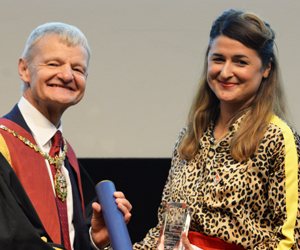 The next presentation was for the new RCVS Inspiration Award, for which there were two recipients this year. The first was Dr Ebony Escalona (pictured) for her work with the Brooke equine charity and for founding the Vets: Stay, Go or Diversify Facebook group.
The next presentation was for the new RCVS Inspiration Award, for which there were two recipients this year. The first was Dr Ebony Escalona (pictured) for her work with the Brooke equine charity and for founding the Vets: Stay, Go or Diversify Facebook group.
“Ebony is a true inspiration… not only because of her academic achievements, but also because of how she applies them. Her own diverse application of veterinary skills led her to create a new Facebook group…. This group, now with nearly 10,000 members, encourages veterinary professionals to seek true career fulfilment and expand the definition of ‘veterinary career’ beyond the traditional,” Stephen said.
The second recipient of the Inspiration Award was Professor Derek Knottenbelt, also this year’s guest speaker, who recently retired from his Emeritus Professorship at the University of Liverpool, where he influenced generations of students.
Stephen May said: “Derek is now a visiting Professor at the University of Glasgow’s Veterinary School in the Weipers Equine Centre. His interpretation of ‘retired’ is somewhat strange, however, for as well as being a visiting Professor, he also runs Equine Medical Solutions, lectures throughout the world as Chair of the British Horse Society, and is now planning his eighth tour as a founding member of the charity Vets with Horsepower.”
An RCVS Fellowship by Thesis was also presented to Dr Neil Hudson, while Dr Judy MacArthur-Clark received her Fellowship by meritorious contributions to the profession. Furthermore, diplomas in small animal surgery (orthopaedics), veterinary cardiology and zoological medicine were also presented.
Chief Executive’s address
Next on the agenda was the inaugural address of RCVS Chief Executive Officer Lizzie Lockett who was appointed to the role in November 2017.
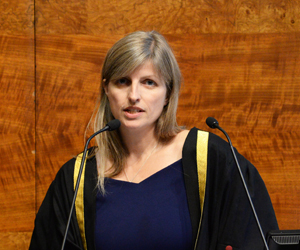 Lizzie (pictured) gave an overview of what the College has been doing and how it has been fulfilling the ambitions of the Strategic Plan since her appointment, citing projects such as the RCVS Leadership Initiative, the Graduate Outcomes project and the College’s ongoing work with the BVA and Government on Brexit.
Lizzie (pictured) gave an overview of what the College has been doing and how it has been fulfilling the ambitions of the Strategic Plan since her appointment, citing projects such as the RCVS Leadership Initiative, the Graduate Outcomes project and the College’s ongoing work with the BVA and Government on Brexit.
She also said increasing efforts are being made to make the College more proactive in its approach to regulation, rather than reacting to events as they happen.
“Although we work hard through our concerns process to ensure individual veterinary surgeons and nurses are fit to practise, and we do this on behalf of the public, waiting until something goes wrong usually means someone – and some animal – has been adversely affected in the process.
“We are therefore putting huge energies into more proactive support of the professions, to ensure they remain fit for purpose and are populated by vets and nurses who are happy and confident, and have the right skills and knowledge to thrive, and can work in environments where learning from mistakes is encouraged,” Lizzie said.
VN Council Chair’s address
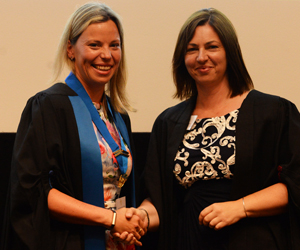 The next address was from Liz Cox (pictured on the right with new VN Chair Racheal Marshall), who had held the post of Chair of VN Council for the past three years, during which she had fronted a campaign to protect the veterinary nursing title, helped lead the VN Futures project and been involved in the crucial work around reviewing Schedule 3 of the Veterinary Surgeons Act.
The next address was from Liz Cox (pictured on the right with new VN Chair Racheal Marshall), who had held the post of Chair of VN Council for the past three years, during which she had fronted a campaign to protect the veterinary nursing title, helped lead the VN Futures project and been involved in the crucial work around reviewing Schedule 3 of the Veterinary Surgeons Act.
In her speech Liz spoke about her ‘love affair’ with veterinary nursing, how she had been inspired to become a VN by witnessing what they do first-hand at the age of 13 during the treatment of her family dog. How, a few years after qualifying as a veterinary nurse, she had become disillusioned with a lack of career progression and left the profession, only to return some years later because she missed the impact that veterinary nurses can have on clients and their pets and the satisfaction that brings.
Speaking of her years as VN Chair she said: “One of the areas I am proudest about in my time with the RCVS has been the VN Futures project. I was certain that we needed to speak to nurses in person, to travel, to engage them, to listen and understand. We have numerous working parties that, importantly, are populated with nurses that wanted to be involved, that had that passion. One day, I hope that one of those nurses or others we have met will be standing where I am now.
“We developed six ambitions to achieve by 2020, all with 3 Rs in mind: recruitment, retention and returners. Above all, we need to ensure we have a workforce that is able to support a growing veterinary world in all of its areas, and we need to offer a career that is sustainable, well supported, rewarding, and has a structure. If we have leavers, it’s because they choose to, not because they have to.”
She added that she looked forward to an expanded veterinary nursing role, with greater scope for career progression and expanded responsibilities so that veterinary nursing can fulfil its potential as a career for life.
Following Liz’s address Racheal Marshall was invested as the new Chair of VN Council with Liz becoming a Vice-Chair alongside VN Council member Matthew Rendle.
President’s address
 The event then moved on to Stephen May’s final address as RCVS President (pictured), in which he spoke about the RCVS being the archetypal “complete professional regulator” that protects the public and their animals through setting standards for entry to the profession, and empowering members of the veterinary professions through codes of conduct aimed at supporting professional capability and wellbeing.
The event then moved on to Stephen May’s final address as RCVS President (pictured), in which he spoke about the RCVS being the archetypal “complete professional regulator” that protects the public and their animals through setting standards for entry to the profession, and empowering members of the veterinary professions through codes of conduct aimed at supporting professional capability and wellbeing.
In particular, he emphasised what emerged as one of the main themes of the day, the need to nurture the new generation of vets and nurses, and move away from a blame culture to one where professionals were more willing to admit, and learn from, their mistakes.
He said: “It is important, with most of our veterinary surgeons and nurses going into primary care, that we recognise the complexity of these roles and the importance of developing professionals to become expert generalists so that they do not just survive but thrive in that sector as well as all the others.
“The Graduate Outcomes proposals that will be ready for consultation later this year, and the new reflective approach to continuing professional development, are both components of the College’s ambition to move us as a profession from what is often a blame, to a learning culture embraced by all.
“Of course, we are all subject to the law of the land if any of our activities fall foul of that law. However, as the Registrar and I have been keen to point out to veterinary students all around the country this year, it is important that society and all members of the profession recognise the clear distinction between misconduct and cases with disappointing outcomes where at worst professional judgement may have been clouded by conflicting demands and needs.”
In reviewing his year as President, Stephen also spoke about the ongoing discussions around the veterinary workforce, which may be affected by the UK leaving the EU, the review into the legislative framework for the veterinary professions and some of the debates and controversies around the College’s position on homeopathy and complementary and alternative medicines in general.
Both of these have been challenges, but at the same time they have provided opportunities to emphasise the importance of the profession to Society and explain what the profession stands for.
He added: “As my year draws to a close, I am confident that I am handing on to Amanda a College that is more confident in itself and its role, and better able to face the challenges of the future, as we restructure our governance and committees, and Lizzie looks strategically at extra staff appointments related to the growth of the profession and all the College’s business.”
Stephen then thanked fellow members of Council, the Operational Board, and RCVS staff, his colleagues at the Royal Veterinary College and the professions as a whole, as well as his family who had supported him through his busy year.
Following his address, Stephen handed over the chain of office and President’s gown for Amanda to be invested as RCVS President, with Dr Niall Connell being invested as Junior Vice-President. He also said farewell to Chris Tufnell as he ended his year as RCVS Senior Vice-President praising him as a brilliant and insightful colleague who always had the progression of the professions as his ultimate goal.
Guest speaker
 This year’s guest speaker was the aforementioned Derek Knottenbelt (pictured), who gave a talk entitled ‘Empowering our successors’ about how established members of the profession can help young veterinary graduates develop into well-rounded, capable and resilient veterinary surgeons and nurses.
This year’s guest speaker was the aforementioned Derek Knottenbelt (pictured), who gave a talk entitled ‘Empowering our successors’ about how established members of the profession can help young veterinary graduates develop into well-rounded, capable and resilient veterinary surgeons and nurses.
Among the subjects covered in the talk was the importance of failure as a character and competence building exercise for professionals and not always something deserving of censure of blame.
He said: “Certain types of error are deserving of censure, such as recklessness and choosing to work when one is not fit. However, other failures can be seen as praiseworthy, particularly where individuals have good reasons for working (slightly) beyond their normal area of practice, and appropriately intervening where a prognosis is otherwise poor.
“All of us will have been mentored by individuals who have influenced our own professional course, and will be eternally grateful to them. It was often in the context of our failures that their encouragement and praise, in focusing us on the opportunities for learning, proved to be amazing tools for bringing success.
“The new graduates of today are quite simply the best possible young people to secure our future. The profession will have a lot to answer for if we cannot embrace them within a professional ‘learning culture’ and give them a life of fulfilment and happiness.”
Photos from Royal College Day are available to download from our Flickr page.